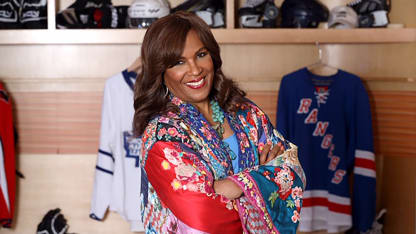The NHL celebrated Black History Month in February, and NHL.com featured people of color who have or are looking to make their mark in the hockey world.
To end the month, Kim Davis, the NHL executive vice president, social impact, growth initiatives & legislative affairs, writes about what Black History Month means to her.
Black History Month a time to 'inform, educate, inspire,' Davis says
League executive VP writes essay for NHL.com

© Michael Benabib/Getty Images
By
Kim Davis / Special to NHL.com
Black History Month is always a powerful time to celebrate the achievements of people of African descent.
It's also a great time to think about what "celebrating" truly means.
Celebrating the history, culture, and accomplishments of a community is never meant to be passive. Instead, it must be active. A true celebration of black history helps all of us connect where we've been to where we are - and where we still need to go.
That's why, for me, Black History Month has always served as a useful tool to inform, educate, and inspire in the quest to achieve full equality. The more we recognize and acknowledge those who came before us - not only the marquee names (like the ever-inspiring Harriet Tubman and Martin Luther King, Jr.) but also the quiet trailblazers who changed their immediate surroundings - the more we can build our own capacity to extend their legacy.
This is especially true when it comes to the sport of hockey.
Twenty-two years before the creation of the National Hockey League, the Colored Hockey League was formed in Halifax, Nova Scotia in 1895. This hockey community in Canada's Maritime Provinces included the descendants of runaway American slaves, who had journeyed through the Underground Railroad to give their children a better life. The life they created up north included participation in our great game and the creation of their own elite hockey league to showcase black talent on the ice - at a time when racism and ignorance fueled the bigoted assumption that they lacked the intelligence and ability to skate.
Rising above these circumstances, the Colored Hockey League made many innovative contributions to the style of hockey that we see in today's NHL. Whereas nineteenth-century hockey had traditionally been slow and controlled, the Colored Hockey League developed a faster and more physical game. It also pioneered goaltenders' ability to drop to their knees to defend pucks and skaters' ability to use the slapshot.
These remarkable developments often go unrecognized - which is why we made the choice to feature them in our Black Hockey History Truck Tour, a mobile museum of black achievement in hockey that will visit 14 markets across North America and has already changed perceptions of our game and its players.
Activations like these are important reminders of the contributions of the African diaspora - not only in our sport, but also in our society. As a product of the African diaspora, I feel uniquely connected to the successes, struggles, and resiliencies that are celebrated during this month. I lived through the Civil Rights Movement; my parents felt the harsh blow of Jim Crow; and my grandparents directly experienced Reconstruction. Black history, to me, is personal and lived. At the same time, it is something that inspires me to continue pushing for positive change - because the real power of black history is how it was created by brave leaders who refused to accept the status quo.
The entire hockey ecosystem has benefitted tremendously from leaders like these. We see this in the story of Willie O'Ree, the NHL's first black player and a 22-year Diversity Ambassador for our game, whose trailblazing life is now featured in the ESPN2 documentary, "Willie." We see this in the bravery of current and former black players who are working to uplift the next generation of diverse players and fans. And we see this in the NHL's commitment to growing our multicultural game in ways that are more reflective of our multicultural society.
There is so much more to come on these efforts - and they will not be limited to Black History Month. I believe deeply that true inclusion is a year-round sport. Echoing what Commissioner Gary Bettman said in December 2019, "inclusion and diversity are not simply buzz words." They are foundational principles of who we are and must be.
As this year's Black History Month draws to a close, I am more certain than ever that so much of "who we are" as a society is profoundly shaped by the diversity within it. Black History Month is an important acknowledgement that all Americans and Canadians -- regardless of race, ethnicity, and gender - are influenced in immeasurable ways by the African American experience. Today and every day, it is truly something to celebrate.

















